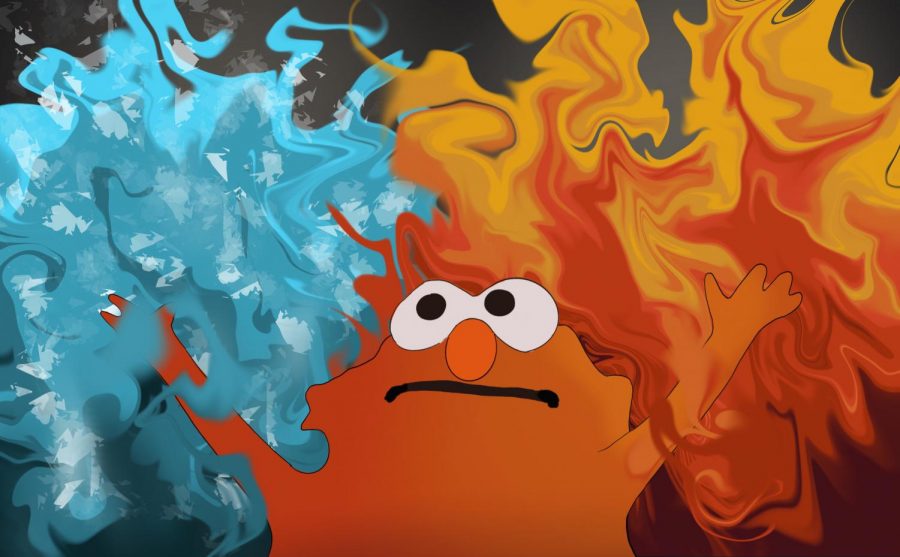Climate crisis ignites concerns of widespread eco-anxiety
February 25, 2021
As cases of mental health disorders like clinical depression have skyrocketed due to the raging pandemic, one condition equally debilitating that remains less discussed is eco-anxiety.
COVID-19 remains a top priority for scientists and political leaders, but the ongoing and worsening climate crisis simultaneously remains a large issue.
For instance, 2020 tied with 2016 for being the hottest year on record, according to NASA.
“The last seven years have been the warmest seven years on record, typifying the ongoing and dramatic warming trend,” GISS Director Gavin Schmidt said. “Whether one year is a record or not is not really that important – the important things are long-term trends. With these trends, and as the human impact on the climate increases, we have to expect that records will continue to be broken.”
2020 also brought devastating wildfires to Australia and California, deadlier-than-usual floods in Pakistan, Louisiana’s worst hurricane in its history and so many other devastating natural disasters.
Though some choose to paint climate change as a hoax, many people realize that these environmental phenomena come as the result of a climate crisis that seems to only grow worse.
In that same year, a survey revealed “About seven in ten Americans, 69%, say they are at least ‘somewhat worried’ about global warming. About three in ten, 29%, are ‘very worried’ about it – the highest level since our surveys began in 2008.”
Those numbers continue to change as an updated survey noted “More than two-thirds of Americans, 67%, are somewhat or extremely anxious about the impact of climate change on the planet, and more than half, 51%, are somewhat or extremely anxious about the impact of climate change on their own mental health,” according to The New York Times.
As global temperatures rise and natural disasters worsen, more Americans are feeling the consequences of unchecked climate change at home, resulting in elevated rates of anxiety, depression and suicide, according to Psychiatric Times.
For example, air quality significantly decreased in California due to its recent streak of wildfires, with the Bay Area having the worst air quality in the world in 2020. The smoky air prevents sunlight from reaching residents.
For people already dealing with psychiatric disorders, the climate crisis only worsens their health. For instance, “A patient with obsessive-compulsive disorder may need to limit exposure to climate- related news and manage his anxiety about CO2 emissions enough to keep his home warm,” according to Psychiatric Times.
These same patients also face a biological risk from climate change. For example, during heat waves, older adults’ bodies don’t regulate temperature as quickly or easily as younger people’s bodies. That temperature regulation is further hindered if they take medicine that impacts the body’s reaction to heat.
For these reasons, dementia and Alzheimer’s patients are put at a higher risk of fainting, hypothermia or even death because of the continuous rise of global temperatures.
Climate change is an issue not just harming adults, but directly impacting children as well.
As a result, children and young adults have joined forces to become the faces of the climate change movement. One of the most well-known climate change activists is 18-year-old Greta Thunberg.
News broadcasts and social media often depict climate change as apocalyptic. It is either the world solves the climate crisis by 2030, or life will cease to exist.
She summed up her generation’s concerns in a speech in 2018.
“Adults keep saying: ‘We owe it to the young people to give them hope.’ But I don’t want your hope. I don’t want you to be hopeful. I want you to panic,” she said.
“I want you to feel the fear I feel every day. And then I want you to act. I want you to act as you would in a crisis. I want you to act as if our house is on fire. Because it is.”
That lack of adjustment is detrimental to developing minds, and as they grow more aware of the climate crisis at a younger age, some kids are losing their childhood to eco-anxiety.
“I feel like in my peer group, you just go right from talking about polar bears dying to ‘Did you see what Maya posted on Snapchat?’ Nobody has a filter to adjust,” 18-year-old Sarah Niles said. “It’s like, the ice caps are melting and my hypothetical children will never see them, but also I have a calculus test tomorrow,” she added.
Environment lessons breed panic attacks among students. Heat waves, floods, hurricanes, tornadoes, storms and the slew of increasing climate caused disasters lead to clinical depression or PTSD.
Echoing the sentiment of Twenty-One Pilots, kids wish they could turn back time to the good old days, since now they are stressed out over climate change.
Instead of enjoying his eighth birthday, second-grader Colin lamented, “My life would be better without climate change.”
Between feeding threatening news to children and literally having a huge countdown clock in
Manhattan that says “The Earth has a deadline,” it is easy to understand why young adults and adolescents have internalized fear and stress regarding global warming.
This narrative, however, isn’t true. “Earth isn’t ending in 12 years. It didn’t end at Y2K or when the Mayan calendar predicted the collapse of civilization in 2012. Earth, as a whole, will be okay—for at least another few billion years. What’s less settled is how humans and the rest of biodiversity on the planet will fare in the decades and centuries to come,” according to Scientific American.
Although climate anxiety is a spreading phenomenon, it can be a much-needed catalyst for change.
Though corporations are largely responsible for releasing emissions that exacerbate climate change, the public needs to be given updated information of how these corporations are modifying their practices to help the planet.
Most of all, the public cannot afford to brush the effects eco-anxiety on mental health aside.
“What’s really important is we start normalizing this,” Dr. Britt Wray said. “Not only to help people who are dealing with this very reasonable distress, but also because allowing those transformations to happen is hugely energizing for actionable climate movement.”








